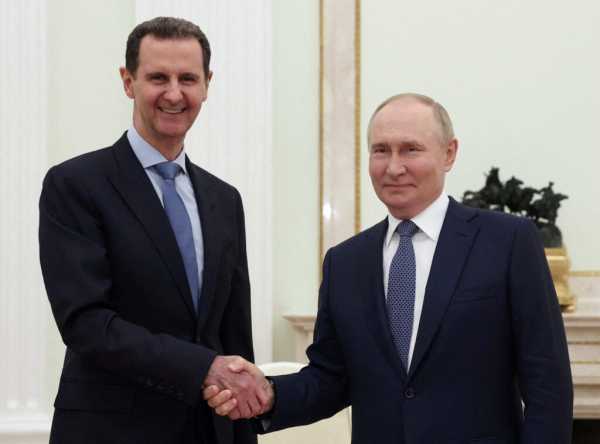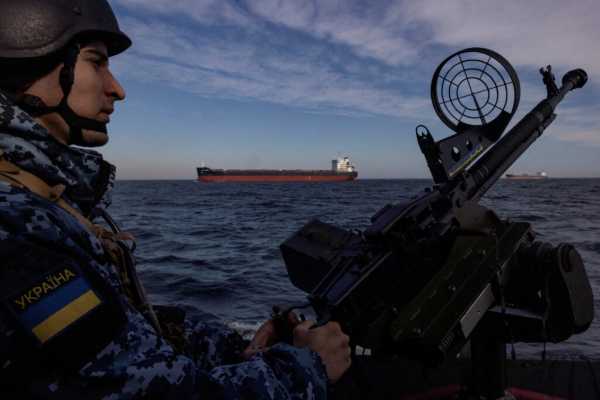
The collapse of the Assad regime in Syria took the world by surprise, but Vladimir Putin’s propaganda machine was among the first to react. After nine years of relentlessly demonizing all anti-Assad forces as “terrorists,” Kremlin television suddenly began describing them in far more respectful terms as “armed opposition groups.” Meanwhile, officials in Moscow soon also suggested that the new rebels were not in fact dangerous religious radicals, but respectable potential partners with whom Russia could do business.
This brazen shift in the Kremlin’s narrative is hardly surprising. After all, Putin is desperate to negotiate a deal with Syria’s new rulers that will allow him to retain control of naval and air bases that are vital to Russian interests across Africa and the Middle East. Still, the significance of Russia’s dramatic shift in tone cannot be overstated.
Russia’s intervention in Syria was the country’s first major military operation outside the former Soviet Union’s borders since the collapse of the Soviet Union. It came at a cost, as Putin poured tens of billions of dollars into a mixed force of military advisers, mercenary units, naval forces, and air forces tasked with propping up the Syrian regime. For a long time, the gamble seemed to pay off handsomely. Putin was widely seen as the savior of Bashar al-Assad, and was able to use this newfound prestige to project Russian influence across the wider region.
Russia’s exploits in Syria have received full coverage across the country’s carefully curated media landscape. Kremlin media have spent much of the last decade trumpeting the war in Syria as a symbol of Russia’s return to great power status, with Moscow pundits constantly positioning the country’s military campaign as a righteous crusade against Western intrigue and Islamist dark forces. There have been endless documentaries, propaganda tours, and even a classical concert amid the ruins of a country devastated by Russian aerial bombardment. All of that now seems to have been forgotten as the Kremlin seeks to ingratiate itself with the new authorities in Damascus.
Putin’s willingness to drop his entire propaganda posture in Syria and calmly accept new military realities should now help the West overcome its paralyzing fear of Russian escalation in Ukraine. Ever since Russia’s full-scale invasion of Ukraine began nearly three years ago, the Western response has been hampered by concerns that supporting Ukraine could provoke Russia to escalate its aggression and lead to a wider conflict. Putin has skillfully exploited these fears, using a combination of nuclear threats and warnings about Russia’s red lines to restrict Western military aid to Kyiv and impose absurd restrictions on Ukraine’s ability to defend itself.
This Western overcaution has angered many in Kyiv, not least because Ukraine has repeatedly exposed Russia’s empty threats. When Putin threatened to defend his Ukrainian gains with nuclear weapons in September 2022 and declared, “I’m not bluffing,” Ukraine promptly called his bluff and liberated the strategically important southern Ukrainian city of Kherson. Instead of reaching for his nuclear briefcase, Putin simply ordered his defeated troops to retreat across the Dnieper River. Likewise, when Ukraine ignored the Kremlin’s bluster and sank or damaged about a third of Russia’s entire Black Sea Fleet, Putin did not use nuclear weapons. Instead, he ordered his remaining warships to withdraw from Russian-occupied Crimea to the relative safety of Russian ports.
The biggest blow to the myth of imminent Russian escalation came in the summer of 2024, when Ukraine crossed the reddest of all Russian red lines by invading Russia itself. As Ukrainian troops poured across the border and began occupying swathes of Russia’s Kursk region, Putin’s response was revealing. He made no attempt to rally his countrymen against the foreign invader or to warn of an impending nuclear war. Quite the opposite, in fact. Rather than up the ante, Putin deliberately chose to downplay the entire Ukrainian offensive as a mere “provocation.”
Putin’s disappointing response to the fall of his Syrian ally Bashar al-Assad is a timely reminder that Western fears of Russian escalation are greatly exaggerated. In fact, whenever Putin faces a determined opponent, he tends to back down. Like all bullies, he seeks to bully his victims. But as we have seen time and again in Ukraine, his threats are almost always empty.
This is good news for proponents of the “peace through strength” strategy, including those in the incoming Trump administration. Putin’s ability to bully the West has been his greatest success since the war in Ukraine, but it should now be abundantly clear that Russia’s sabre-rattling is based on bluff.
The Kremlin’s failure to save its Syrian ally has revealed the modest reality behind Putin’s great power stance. Russia’s military is clearly overwhelmed by the ongoing invasion of Ukraine, while Putin is in a much weaker position than he would like us to believe. Crucially, he is also more than capable of completely rejecting his own propaganda and rewriting history when necessary. If he faces the prospect of military defeat in Ukraine, there is every reason to believe he will retreat again, telling his media machine to save its blushes.
Peter Dickinson is editor of the Atlantic Council's UkraineAlert service.
Source: Source



